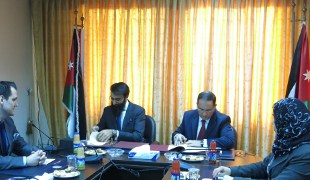Agreement on mutual cooperation and on the provision of technical expertise on constitutional law and the jurisdiction of the Constitutional Court in the Jordanian legal system until 2016
The Judicial Institute of Jordan and the Max Planck Foundation signed a Memorandum of Understanding (MoU) on 3 February 2015 in Amman, Jordan, establishing a framework for mutual cooperation and capacity building. The MoU establishes the provision of technical expertise and training for judges and judicial trainees on matters related to comparative constitutional law, the jurisdiction of the Constitutional Court in the Jordanian legal system and how the work of the ordinary courts in Jordan will affect, and be affected by, the jurisdictional competences of the Constitutional Court.
The delegation from the Max Planck Foundation met with the Director of the Judicial Institute of Jordan, His Excellency Dr. Tha’er al-’Adwan to discuss the overall objectives of the cooperation and the substantive topics that would be covered throughout the planned workshops. This was followed by an official signing ceremony of the MoU by the representatives of the two organisations. Dr. Tha’er al-’Adwan welcomed the cooperation and thanked the Max Planck Foundation for their efforts and for their expertise.
The Foundation will initially conduct several workshops and seminars for the Judicial Institute of Jordan, which will include detailed analyses of Constitutional Court systems and models from a comparative perspective, and will focus on the substantive and procedural jurisdiction and competences of the Constitutional Court of Jordan vis-à-vis the jurisdiction and competences of the ordinary courts. As the Constitutional Court of Jordan has been established relatively recently, the envisaged workshops will particularly cover the Court’s jurisdiction and how decisions of the Court will affect the work of the ordinary courts. The overall programme is aimed at strengthening and enhancing the technical capacity of the ordinary judges and the competences of the ordinary courts in general.
The project will continue until the end of 2015 and is funded by the German Foreign Office.

